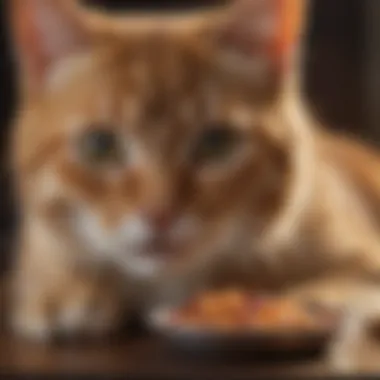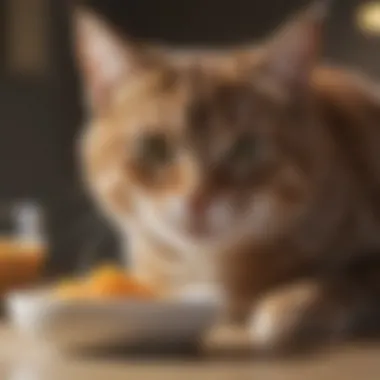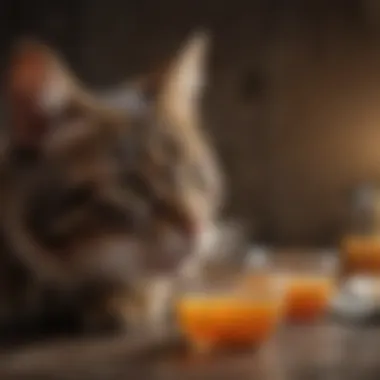Understanding the Purina Feline Renal Diet for Cats


Intro
Chronic kidney disease (CKD) is a common ailment in cats, especially in older felines. Managing this condition effectively necessitates a well-balanced diet tailored specifically for renal support. The Purina Feline Renal Diet stands out among various options available today. This specialized diet does more than just provide nutrition; it aims to slow the progression of kidney disease while ensuring overall health.
Understanding this diet is essential for any cat owner seeking to improve or maintain the quality of their pet's life amidst health challenges. In this article, we will explore the key components, ingredients, and benefits of the Purina Feline Renal Diet, offering insights into why it is an important choice for managing chronic kidney disease in cats.
Key Points of Discussion
Throughout this article, we will cover several critical aspects concerning the Purina Feline Renal Diet:
- Nutritional strategies: What makes this diet unique and effective?
- Key ingredients: A closer look at what goes into this diet.
- Health benefits:Understanding how this diet contributes to renal health.
- Practical advice: For cat owners on implementing this dietary choice.
Each section aims to establish a thorough comprehension of the Purina Feline Renal Diet, enabling you as a pet owner to make informed decisions about your cat's dietary needs.
Intro to Feline Kidney Health
Feline kidney health represents a critical aspect of overall wellbeing in cats. Chronic kidney disease (CKD) is one of the most common conditions affecting cats, particularly as they age. Understanding this topic can facilitate better management strategies, improving the quality of life for affected animals. The relationship between diet and kidney health is especially profound, with nutrition playing a pivotal role in managing renal function.
Diet helps to maintain a balance of essential nutrients while minimizing the workload on the kidneys. A specialized renal diet, such as the Purina Feline Renal Diet, can significantly benefit cats diagnosed with CKD. This diet is formulated to provide nutritional support that caters specifically to the needs of cats with compromised kidney function. In the coming sections, we will delve deeper into the aspects of feline kidney health, emphasizing the importance of making informed dietary choices.
The Importance of Diet in Cats
Diet is a fundamental component in the maintenance of health and vitality in cats. Cats are obligate carnivores, meaning their diet must primarily consist of meat. However, when faced with chronic conditions like CKD, dietary adjustments become crucial. A suitable diet can help preserve kidney function, manage symptoms, and extend the lifespan of affected cats.
A well-balanced diet not only supports the body’s overall function but also aids in reducing waste products that the kidneys must filter. Therefore, selecting an appropriate diet is vital. The focus should be on lower protein levels that are high in quality, as this prevents the buildup of harmful substances in the bloodstream.
Furthermore, certain nutrients must be limited or adjusted. For instance, sodium levels may need to be reduced to alleviate stress on the kidneys. Properly addressing these dietary aspects can lead to significant improvements in a cat’s renal health.
Understanding Chronic Kidney Disease in Cats
Chronic kidney disease is a progressive and irreversible deterioration of kidney function. It affects a cat's ability to filter blood, manage electrolytes, and eliminate waste. As the disease advances, numerous health complications may arise.
Several factors contribute to the development of CKD in cats, including age, genetics, and pre-existing health conditions. Common symptoms include increased thirst and urination, weight loss, lethargy, and poor coat condition. Regular veterinary check-ups become essential for early diagnosis and management.
Once diagnosed, cats with CKD require dietary adjustments aimed at slowing the progression of the disease. The choice of diet plays a critical role in managing the condition. Nutrition tailored to renal care can minimize stress on the kidneys, ultimately supporting longevity and quality of life for afflicted cats.
"Understanding the significance of kidney health is paramount for every cat owner. A proactive approach to diet can transform the lives of our feline companions."
Overview of the Purina Feline Renal Diet
The Purina Feline Renal Diet is designed to address the specific nutritional needs of cats with chronic kidney disease. Understanding this diet is crucial for pet owners who seek to manage their cats' conditions effectively. Diet plays a significant role in the overall well-being of felines, particularly those with compromised kidney function. The formulation of this diet reflects current research and clinical practices aimed at prolonging renal health and enhancing quality of life.
Composition of the Diet
The composition of the Purina Feline Renal Diet is tailored for renal support. It is lower in protein but still provides sufficient amino acids for necessary bodily functions. This formulation helps to reduce the workload on the kidneys, which is vital for cats suffering from chronic kidney disease.
The macronutrients, vitamins, and minerals are balanced carefully to ensure optimal nutritional value. The diet typically contains:


- Lower protein levels to decrease kidney stress
- Reduced phosphorus to mitigate further damage to renal tissues
- Controlled sodium intake to help manage blood pressure
- Increased potassium to support muscle and nerve function
The fiber content is also significant, aiding digestion and stool quality, which are essential factors in nutrient absorption and gastrointestinal health.
Key Ingredients and Their Functions
The key ingredients in the Purina Feline Renal Diet play vital roles in promoting renal health. Understanding these ingredients can help pet owners appreciate how they contribute to a cat's overall health. Some of the notable components include:
- High-quality protein sources featured in controlled amounts, ensuring cats still receive necessary nutrients without overwhelming their kidneys.
- Omega-3 fatty acids are present for their anti-inflammatory properties, which can help reduce kidney inflammation.
- Antioxidants, like vitamins E and C, help manage oxidative stress that could impact kidney function.
- Fiber sources, such as beet pulp, aid in promoting gut health and stabilizing blood sugar levels.
"A well-balanced diet tailored for renal health is essential for cats with chronic kidney disease."
This combination of ingredients not only aids in managing existing conditions but also enhances palatability, making it more appealing for cats who might be picky eaters due to illness.
Nutritional Considerations
Nutritional considerations play a crucial role in managing a cat's renal health, especially when dealing with conditions like chronic kidney disease (CKD). Proper nutrition can significantly influence the progression of the disease, often making a difference in the quality of life. The Purina Feline Renal Diet is meticulously formulated to address the unique dietary needs of these cats. Here, we will explore three key elements: protein requirements, sodium management, and phosphorus restriction.
Protein Requirements for Renal Health
For cats with renal issues, the balance of protein intake is essential. Cats are obligate carnivores, meaning they require protein for various bodily functions. However, in cases of CKD, excessive protein can place added stress on the kidneys. Thus, the Purina Feline Renal Diet offers a moderate protein level. This approach aims to provide enough protein to support the cat's lean body mass while reducing the waste products that the kidneys must filter.
The specific protein sources used in this diet are of high quality, ensuring better digestibility. This not only helps minimize the burden on the kidneys but also aids in maintaining muscle mass, which can be crucial for overall health.
Sodium Management in Kidney Diets
Sodium is another significant dietary component to consider in renal health. Elevated sodium levels can lead to increased blood pressure and further stress the kidneys. The Purina Feline Renal Diet restricts sodium while still meeting necessary dietary needs. This careful restriction supports cardiovascular health and helps manage blood pressure effectively.
Monitoring sodium intake is critical, as excessive sodium can exacerbate the symptoms of CKD.
Phosphorus Restriction and Its Impact
Phosphorus levels in the diet also significantly affect renal health. High phosphorus can lead to an increase in serum phosphorus levels, resulting in mineral imbalances that can harm the kidneys over time. The Purina Feline Renal Diet is designed to contain low phosphorus levels, aiming to slow the progression of kidney disease and prevent secondary complications.
By managing phosphorus intake, the diet supports not only kidney function but also overall bone health. The restricted phosphorus can help minimize the the risk of secondary hyperparathyroidism, a common complication in cats with CKD.
These elements, therefore, require thorough understanding and careful evaluation by pet owners, guiding them in making informed decisions cooncerning their cats' diets.
Benefits of the Purina Feline Renal Diet
The Purina Feline Renal Diet offers a range of benefits specifically formulated to address chronic kidney disease in cats. This diet plays a crucial role in promoting kidney health and overall well-being. The special formulation aids in supporting renal function, managing weight, and enhancing the palatability for cats, particularly those who may be picky eaters.
Support for Long-Term Renal Function
Chronic kidney disease is a progressive condition that requires careful management. The Purina Feline Renal Diet contains a reduced protein level which is easier on the kidneys. The diet also includes omega-3 fatty acids and antioxidants, both of which can help to support kidney health. These components help minimize the workload on the kidneys while providing adequate nutrition.
"Feeding cats a specialized diet can help prolong their quality of life and maintain kidney function over time."


Maintaining long-term renal function is essential. Regular use of this diet can lead to better outcomes in managing the disease. By controlling protein and phosphorus levels, it eases the impact of chronic kidney disease.
Weight Management and Its Relevance
Weight management is vital for cats suffering from kidney issues. The Purina Feline Renal Diet is designed to support healthy weight while still providing essential nutrients. Obesity can complicate chronic kidney disease, making it more difficult to manage. The diet offers a balance between calories and nutrients, ensuring cats receive the needed vitamins and minerals without excess fat or calories.
Controlling weight helps improve overall health, enhances mobility, and ensures that cats remain active. Cats on this diet can benefit from portion control and the right feeding schedule to maintain a healthy weight.
Enhanced Palatability for Cats
One of the often overlooked aspects of dietary intervention for cats is palatability. The Purina Feline Renal Diet is formulated to be appealing to cats. Cats are notorious for being selective eaters. If a cat does not like its food, it may not consume enough to meet its dietary needs, even with the best nutritional intentions.
The diet includes ingredients that are not only healthy but also tasty for cats. This ensures they are more likely to enjoy their meals, encouraging better eating habits. When cats find their food enjoyable, it significantly enhances compliance with diet recommendations.
Feeding Guidelines
Feeding guidelines are crucial for the health management of cats with chronic kidney disease (CKD). The right diet can significantly influence a cat's overall well-being and provide a support system for their kidneys. When applying the Purina Feline Renal Diet, specific elements should be taken into account. Proper feeding can lead to better nutrient absorption, improved renal function, and increased quality of life for affected cats.
Transitioning to a Renal Diet
Transitioning a cat to a renal diet should be done carefully and intentionally. This process can take several days or even weeks, depending on the cat's previous diet and individual preferences. Gradually mixing the new food with the current diet will help facilitate this change. A common method is to start with approximately 25% of the new diet combined with 75% of the old one. Each day, the ratio can be adjusted until the cat is fully transitioned to the new food. This gradual approach reduces the likelihood of digestive upset and encourages the cat to accept the new diet.
Key considerations during this transition include:
- Monitoring the cat's appetite and general behavior during the change.
- Being attentive to any signs of digestive issues, such as vomiting or diarrhea.
- Consulting with a veterinarian if there are any concerns during the transition period.
Portion Control and Feeding Schedule
Portion control is another essential element in managing a cat on a renal diet. Overfeeding can lead to obesity, which is particularly detrimental to cats with kidney issues. Additionally, restricted portion sizes can help ensure the cat receives the appropriate balance of nutrients.
Establishing a regular feeding schedule can promote routine and predictability in a cat’s daily life. Ideally, splitting daily amounts into smaller, more frequent meals can mimic the cat's natural grazing behavior. This strategy can also be beneficial for optimizing nutrient absorption while preventing the cat from feeling overly hungry.
Common recommendations for portion control include:
- Following the feeding guidelines established by the manufacturer of the renal diet.
- Measuring food accurately to ensure that you adhere to the recommended daily servings.
- Adjusting portions based on the cat's activity level and body weight, in consultation with a veterinarian.
It is essential to remember that every cat is unique. What works for one may not work for another. Always monitor their progress and adjust accordingly.
By following these feeding guidelines, pet owners can help their cats navigate the challenges posed by chronic kidney disease, potentially prolonging their lives and improving their overall health.
Monitoring Health and Well-Being
Monitoring the health of cats on the Purina Feline Renal Diet is crucial for ensuring their well-being and adjusting care as necessary. Chronic kidney disease (CKD) can cause changes in a cat's condition, making continuous oversight essential. By regularly assessing a cat's response to diet, the owner can identify what works best for their pet and adjust accordingly. This not only contributes to the cat's comfort but also enhances the effectiveness of the diet in managing kidney health.
Regular Veterinary Check-Ups
Regular veterinary check-ups are pivotal for cats suffering from CKD. These appointments allow for a comprehensive assessment of a cat's renal function, hydration levels, and overall health. During these visits, veterinarians can perform blood tests and urinalysis that provide insight into how well the renal diet is working. Moreover, these evaluations enable the detection of potential complications early, which is essential for timely intervention.


Some key aspects of these check-ups include:
- Evaluation of Blood Work: Monitoring blood urea nitrogen (BUN) and creatinine levels informs how well the kidneys are functioning.
- Assessment of Body Condition: Weight changes can indicate important shifts in health, either from nutrient absorption issues or other health problems.
- Hydration Status: Dehydration can be a significant concern for cats with kidney issues, and veterinarians can assess hydration levels and advise on water intake.
Signs of Improvement or Decline
Recognizing signs of improvement or decline is essential for cat owners to gauge the effectiveness of the Purina Feline Renal Diet. Changes in behavior, eating habits, and overall demeanor can be indicators of a cat's response to dietary adjustments.
Signs to monitor include:
- Appetite Changes: A restored appetite may indicate improved health, while a decrease could signal a need for reevaluation.
- Energy Levels: Increased playfulness or activity can be a positive sign; lethargy may need immediate attention.
- Weight Stability: A steady weight is often a good indicator. Weight loss might necessitate a change in care or diet.
- Coat Condition: A healthy, shiny coat often reflects good overall health. Dullness or excessive shedding should be noted.
Continuous assessment and communication with the veterinarian are vital to adapt the care plan as needed. This proactive approach can lead to enhanced quality of life for the pet.
Common Myths About Feline Renal Diets
Understanding the common myths about feline renal diets is crucial for pet owners navigating the complexities of managing chronic kidney disease in cats. Misconceptions can lead to poor dietary choices and negatively affect the health and well-being of affected felines. In this section, we will explore two prevalent myths, highlighting misunderstandings about protein intake and confusion surrounding grain-free diets.
Misunderstandings Regarding Protein Intake
One of the most widespread myths about feline renal diets is that they should entirely eliminate protein. Many believe that a low-protein diet is the best approach for all cats with kidney disease. However, not all protein is detrimental. Cats require protein for their overall health, including muscle maintenance and immune function.
Instead of complete elimination, veterinary nutritionists often recommend a controlled protein intake. This means providing high-quality protein in adequate amounts while reducing the overall quantity. It helps maintain muscle mass without overstressing the kidneys.
"Protein restriction must be balanced to prevent muscle wasting while ensuring renal function does not decline."
Additionally, the source of protein matters. Proteins from animal sources are generally more beneficial than plant-based options. This is due to their higher biological value, making it easier for cats to utilize them effectively. Therefore, it is essential to consult veterinary professionals for personalized recommendations based on each cat's needs.
Confusions about Grain-Free Diets
Another significant myth circulates around grain-free diets for cats with chronic kidney disease. Many pet owners believe that removing grains from a cat's diet will automatically improve kidney function. While grain-free diets have gained popularity in recent years, they do not always align with renal health needs.
Grains can provide essential carbohydrates and fiber, contributing to the overall nutritional balance. Additionally, high-quality renal diets, like the Purina Feline Renal Diet, may include grains that serve specific functions. These grains aid in digestion and promote a feeling of fullness, which can be beneficial in weight management.
It is also critical to recognize that not all cats have the same dietary requirements. Some cats may have sensitivities to certain grains, while others do well with a balanced diet that includes grains. Again, it is best to discuss dietary choices with a veterinarian who understands your cat's specific health profile.
In summary, navigating dietary myths is essential for pet owners focused on managing renal health. Addressing misunderstandings around protein intake and grain-free diets can lead to more informed decisions about feeding practices.
Finale
The conclusion is a pivotal element in any discussion regarding the management of chronic kidney disease in cats. In the context of the Purina Feline Renal Diet, it serves to recap the essential role that a carefully formulated diet plays in the health and well-being of felines suffering from this condition. Diet is not merely a side aspect; it is fundamental in alleviating symptoms, supporting kidney function, and enhancing the overall quality of life. By reviewing the composition and key ingredients of the diet, pet owners can appreciate how it specifically targets the needs of their affected cats. Moreover, nutritional management provides a proactive approach to delaying the progression of kidney disease.
The Role of Diet in Managing Kidney Disease
Diet directly influences the health of a cat's kidneys. It is essential to understand that when a cat has chronic kidney disease, the kidneys struggle to process certain nutrients effectively. The Purina Feline Renal Diet is designed to reduce the workload on the kidneys while providing balanced nutrition.
- Lower Protein Levels: This diet features controlled protein levels, which helps to manage the accumulation of waste products in the blood. It ensures that cats receive adequate amino acids without overburdening their kidneys.
- Reduced Phosphorus: Excess phosphorus can lead to further complications, such as bone and cardiovascular issues. This diet limits phosphorus intake, which is crucial for maintaining overall health.
- Increased Omega-3 Fatty Acids: This ingredient plays a role in reducing inflammation and may improve kidney function.
Transitioning to this renal-specific diet can help improve the quality of life for cats diagnosed with kidney disease. It gives pet owners a strategic way to manage a serious condition.
Encouragement for Pet Owners
For pet owners navigating the complexities of chronic kidney disease in cats, understanding dietary implications offers not just knowledge but also an approach to care that can significantly impact their pet's health outcomes. The Purina Feline Renal Diet represents hope, as it is formulated to address specific needs that arise with this condition.
- Be Informed: Knowledge is power, and staying informed about dietary options empowers pet owners to make choices that support their cats’ health.
- Engage with Vets: Regular consultations with a veterinarian can provide personalized guidance and ongoing support. This ensures the diet remains suitable as a cat’s condition evolves.
- Observe Changes: Keep an eye out for changes in your cat’s behavior or health after initiating this diet. Positive observations can be very encouraging and affirm the right dietary choice.







